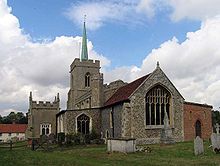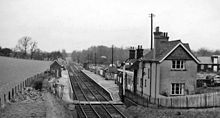- Braughing
-
Braughing (pronounced /ˈbræfɪŋ/) is a village and civil parish, between the rivers Quin and Rib, in the non-metropolitan district of East Hertfordshire, part of the English county of Hertfordshire, England. Braughing was a rural district in Hertfordshire from 1935 to 1974.[1]
Contents
History
Prehistory
There is some evidence of human activity in the Mesolithic, Neolithic and Bronze Age, but settled habitation began in the Iron Age, around the 3rd century BC. It was probably a trading post, situated on the navigable extreme of the Rib, providing a route to the larger River Lea. In the late pre-Roman period it may have been the capital of the Trinovantes and the seat of such kings as Addedomarus and Tasciovanus.
Roman times
Main article: Braughing Roman TownAt Ford Bridge, near Braughing there was a significant town in Roman times, situated close to several major Roman roads, including Ermine Street (now the A10), Stane Street (now the A120) and the Icknield Way, and covering at least 36 hectares. The town was a Roman industrial centre for the manufacture of pottery. When the River Rib is in full flood, bricks, tiles and other more interesting artefacts from the Roman settlement are washed from its banks.[2]
The Latin name of the town is, as yet, unknown.
Saxon times
After the Roman period it was settled by the Anglo-Saxons: the earliest form of the name Braughing is Breahinga, Old English for the people of Breahha, who was probably a local leader. It is mentioned in the Domesday Book (1086) at Brachinges.
Gatesbury
Little remains of this hamlet, which lies to the east of the B1368 close to the Puckeridge junction. Originally part of Westmill parish, Gatesbury is now firmly within the parish of Braughing. Its name originates from the Gatesbury family, who held the manor from the late 12th century up to the 15th century, when it was passed to the FitzHerberts.
Customs
Pork sausages
The village is famous for the Braughing Pork Sausage first made in 1954 by Douglas White and his wife Anna. The recipe has remained the same and the sausages are still made in the shop using the original recipe.[3]
Old Man's Day
On 2 October 1571,[4] as the funeral bell was being tolled, the coffin of a local farmer, Matthew Wall, was being carried down Fleece Lane towards the village Church of St Mary the Virgin[disambiguation needed
 ].
].Matthew's fiancée and other mourners were deeply distressed. He was only a young man. As they made their way to the funeral service, one of pallbearers slipped on the damp autumn leaves and they dropped the coffin - waking young Matthew, from what was simply a deep sleep. Confused and wondering wherever he was, he began frantically hitting the inside of the wooden case with his fist. The mourners removed the lid and were overjoyed to find him alive and well.
Matthew had been in a coma and had been suffering from what is believed to be a form of epilepsy. A year after this strange event he married his beautiful fiancée and lived many more years. When eventually he did die in 1595, his will made financial provision for Fleece Lane to be swept each year, after which the funeral bell, and then a wedding peal, were to be rung. The money, invested in Braughing Parish Charities also paid for his grave to be pegged with brambles to prevent grazing sheep from damaging it.
The 2nd October is, to this very day, known as Old Man's Day. The tradition still continues and schoolchildren now sweep the leaves from the lane, the bells are rung, and a short service is held at Matthew Wall's graveside.[5]
Transport
At one time there was a station on the ex-GER St Margaret's - Buntingford branch which closed in 1964.
Famous residents
- Addedomarus, a king of south-eastern Britain in the late 1st century BC, moved the Trinovantian capital from Braughing to Camulodunum (Colchester, Essex).
- John Brograve, (1538–1613), a lawyer and politician, was the Member of Parliament for Preston, and was custos rotulorum, keeper of the county records of Hertfordshire for thirty years.
- Brigadier Richard Hanbury was High Sheriff of Hertfordshire in 1960.
- Brodie Henderson (engineer), (1869 – 1936), was in charge of railway lines used to transport Allied troops and supplies during the First World War and worked for many railroad corporations across South America, Australasia and Africa. He was High Sheriff of Hertfordshire in 1924.
- George Meriton (born in Braughing, circa 1564 and died 1624) was a churchman who became Dean of Peterborough in 1612 and Dean of York in 1617.
- Ivor Spencer-Thomas, an agricultural inventor and entrepreneur, who lived and farmed in Braughing from 1934 until 1973, made a major impact on the prosperity and working practices in the village during the economic depression of the 1930s.
- Owen Spencer-Thomas, (born in Braughing in 1940) was a television and radio news journalist, pioneer and campaigner for disabled people.
- Charles Ward (born in Braughing in 1875) was an English cricketer. He died in 1954.
- Matthew Wall had a brush with death on 2 October 1571, when pallbearers, believing him to be dead, dropped his coffin on the way to his funeral and woke him up.
- Sally Wentworth, the pseudonym used by Doreen Hornsblow (1930s –2001), was a romantic novelist and writer of seventy novels in Mills & Boon's from 1977 to 1999.
Sources
- ^ [1] A Vision of Britain through time. URL accessed March 8, 2008
- ^ [2] Francis Frith Photographic website. URL accessed March 8, 2008.
- ^ [3] Braughing Sausage Company website accessed 1 October 2010.
- ^ The dates of Matthew Wall's "funerals" are recorded on a tapestry on a wall in the parish church.
- ^ Additional information on this item was given to me by a former Churchwarden of Braughing parish, Owen Spencer-Thomas, 1964-1970.
External links
Categories:- Villages in Hertfordshire
- Civil parishes in Hertfordshire
Wikimedia Foundation. 2010.


